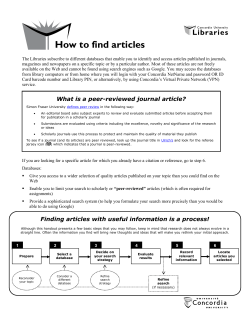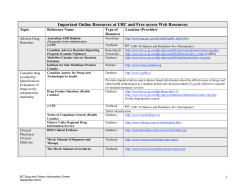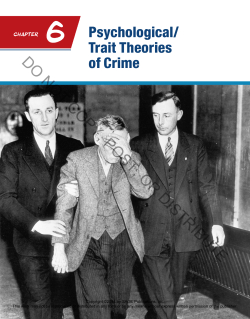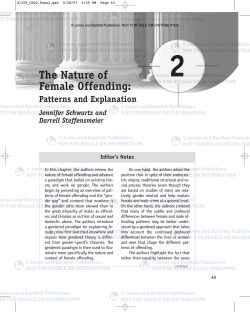
III. Search the Databases for Journal Articles,Technical Reports, Conference Proceedings and Standards
III. Search the Databases for Journal Articles,Technical Reports, Conference Proceedings and Standards 1. What are databases? In general, databases are organized collections of information. For example, TSU Library’s online catalog is a database as well as electronic periodical indexes that provide full-text articles, including ScienceDirect, Wiley InterScience, and citation Indexes such as CompendexWeb and others. You may locate and access Library’s databases online from our web page at http://www.tnstate.edu/library/database_oncampus.htm In order to use the databases properly, you should be able to understand the structure, type, coverage and attributes of them. a. StructureDatabases contain records that contain information about each item within those databases. For example, the Library’s online catalog has a record for each book, journal, microfilm, etc owned by it. In turn, each record contains blocks of information called fields. The fields in a record may be labeled author, title, publisher, subject headings, and others. Other database records may contain fields that include author, title, title of the periodical, volume number, date, year and page numbers. b. TypeThe nature of the information contained in a database determines its type. The main types of databases include Bibliographic, Full-text Numeric, Image, Audio and Mixed. Bibliographic databases do not contain the items, however, they provide information as to where you can find it. The information provided by the bibliographic database may contain items such as Author, Title, Publisher, Date, Volume Number, Page Number and others that is called “citation”. Sometimes they include abstracts ( a summary) or descriptions of items. If you are interested in finding records or citations about a certain topic then you can choose to use these databases to create bibliographies. However, if you want to read the information in its entirety, you will either locate the source given in the Title : record or use a full-text database. An example of a record from a bibliographic database such as an online catalog may look like this: Governments, parties, and public sector employees : Canada, United States, Britain, and France / André Blais, Donald E. Blake, Stéphane Dion. Author : Blais, André. Call Number : JF1601 .B53 1997 Publisher : Pittsburgh : University of Pittsburgh Press ; [Montréal] : McGillQueen's University Press, 1997. Subject Heading(s) : Civil service. Public officers. Political parties. Comparative government. Fonction publique. Gauche (Science politique) Partis politiques. Institutions politiques comparées. Régimes politiques. Description : ix, 189 p. ; 24 cm. Notes : Includes bibliographical references (p. 171-183) and index. Are public sector employees in Canada better off with the liberals? - In search of the bureaucrat's friend on Capitol Hill -- Must British civil servants fear the Tories? -- Should French civil servants vote for the left? Series Title : Pitt series in policy and institutional studies Other Name : Blake, Donald E., Dion, Stéphane. ISBN : 0773516964 (paper : acid-free paper) DBCN : AAZ-5428 Holdings : Item Holdings Location Shelf - Williams Campus Call Number JF1601 .B53 1997 Volume Material Status BOOK OnHold We gather from much information from this record. We get the title of the book, author(s) or editor(s), call number, publisher, place of publication, publisher and the year copyrighted and published, subject area of the book, number of preliminary pages, number of pages in the text, whether or not the text contains illustrations, size of the book, whether or not the book contains bibliographical references and an index, names of co-author(s) or editor(s), whether or not the book is part of a series, international standard book number assigned to the book, and the location and the availability of the item you are searching for. Bibliographic databases A bibliographic index for journal articles such as Wiley Interscience will provide citations and abstracts on your topic. For example, you may search under Civil Service and Germany. If you used the above example, you will retrieve 12 records which are available to you immediately. Press Abstract button for a full citation for a record. For example, you will retrieve the accession number , title, Author(s), First author affiliation, serial title, abbreviated serial title, volume, issue, issue date, publication year, pages, language, ISSN, CODEN, document type, publisher, abstract. Full-text Databases These databases are called full-text because they contain the complete text of publications. For example, EbscoHost provides full-text articles from public administration journals and books in addition to summaries. For example, a search under civil service will retrieve 3075 documents. You may choose to read the abstract only to determine if this article is useful for your research. If so you may want to read or print the article. Numeric Databases These databases generally provide numeric data, including statistics, financial data, census information, economic indicators and others. For example, FIS Online will provide statistical information about companies and countries. Census Data would provide statistics about people, business and others. Image Databases These are the databases that give you access to art prints, animations, photos and others. For example, if you access the Library’s Virtual Reference web page you will find a list of art resources that display images. Audio Databases These databases provide access to audio clips to music and sound effects. For example, on the Internet Public Library Listening Room (www.ipl.org) you may listen to and observe the videos of Ray Brooks, Steve Wood Quintet, Pamela Wise, Blue Dog and others. c. Coverage The selection of appropriate databases is an important factor in finding relevant information. A description of information covered by a database is usually found in the introductory screen. Subject AreaSome databases cover a specific subject area or discipline such as Public Administration, psychology, nursing and others. Others cover areas in more general in nature or a mixture of subject areas. For example, in Public Administration, your library provides you access to EbscoHost, Infotrac, Congressional Universe, Westlaw, Wiley Interscience and Wilsonweb-Social Sciences. You can also find a list of databases according to their subject coverage in the Library’s web page under Databases by Subject at http://www.tnstate.edu/library/databases_subject.html Type of PublicationDatabases may contain information from only periodicals. For example, Project Muse will give you access to periodical articles they publish in the areas of social sciences. Some databases will include information from a combination of sources such as periodicals and books. For example, WilsonWeb-Social Sciences, and Wiley InterScience will provide you with articles from periodicals and chapters from books. Some databases include only popular sources such as magazines and newspapers. You can use these databases for leisure reading. On the other hand, some databases include scholarly materials found in scientific journals, conference proceedings and reports. For example, Wiley InterScience, Project Muse and SpringerLink will provide access to scholarly journals and materials. Databases differ in terms of frequency of updating materials, accessibility of the most recent periodical articles and the publication dates of the materials included. Sometimes publishers put an embargo on the availability of the recent issues. For example, while searching the EBSCOHost, you may come across some periodicals that are not currently accessible. That is, an embargo has been placed for the last two years. Another feature to consider in selecting a database is the availability of the material. You may select a full-text database so that you can read the material immediately. Or you may choose a database that may provide only bibliographic information, however, you library owns a majority of the items. If you are willing to wait, you may use a more comprehensive database that indexed a great number of items your library does not subscribe to but is able to obtain them for you through interlibrary loan. The decision is yours. d. Attributes After you make the selection of the databases you would like to use, you will need to determine if the databases use controlled vocabulary and if the databases do field searching or free-text indexing. In performing searches you will find that some databases use controlled vocabulary which is a specific list of subject terms in organizing the database contents by subject. If you want to retrieve relevant items or information , you should be aware of “controlled vocabulary”. For example, ERIC provides you with the ERIC Thesaurus. This is a list of subject terms you can use to retrieve the relevant information you need. If you look under Government and Politics you will find 166 subject headings to chose from. Subject Headings may be found in special thesauruses, like in ERIC, or may be provided by the database or in the Library of Congress Subject Headings source. You may search most databases by subject, using controlled vocabulary OR keyword, by using your own words. Some databases use field searching which means that the search term you used is only looked in specific fields. For example, if you are using the Library’s online catalog and select the keyword search, your search will locate items with that specific search term in the title, subject or content fields. On the other hand, some databases use freetext searching which means that the search term you have selected will locate items anywhere in a document or record. This type of searching may return false drops or irrelevant items because the search term you have located will be located no matter where it is. Some databases may give you the choice for field or free-text searching. Check the sites for this information before you begin your search. 2. Searching Databases A. Search Strategies – Your library provides access to over 101 databases. You can search these databases from any computer on campus and/or from off campus sites. In selecting the type of database that will provide appropriate and relevant articles, you may consider the following: • subject discipline of your topic – specialized or multidisciplinary • type of resources needed – basic sources, scholarly sources or professional/trade sources • the target audience – is the research for a term paper, independent study, senior project, thesis or dissertation? B. Use of Databases Subscribed by TSU Libraries relevant to the Institute of Government. Your Library subscribes to over 101 online databases in general and subject fields. The databases in subject field – Public Administration include the following that provide the most appropriate and relevant information: CIAO (Columbia International Affairs Online) Contains working papers, books, policy briefs, case studies, course packs and maps. Truncation: *and ? Search Tips: 1. You need to use truncation (*) to search for words that begin with the same letters. For example, global* will return with globalization, globalizing. 2. Use ? as a placeholder for any single letter. E.g., f?n will return fun, fan, or fin. Congressional Universe Years Covered: Varies by source, ranging from 1987 to present Relevancy: Laws, legislative activities, public policy, American politics. Truncation: *, ! Search Tips: Each part of Congressional Universe necessarily uses different search methods. For example, to search for regulations in the Federal Register, you need to specify the citation page number. If you are searching for testimony before Congress, you can search by keyword and by the witness’ name. Search form looks like this: Use this form to find country information by keyword. Country List Keyword: Entry Required Date: e.g. Argentina and beef Previous six months From: To: Examples Notice that you can select dates within which you want your information to come. Note also there is a dropdown country list you can access. Project Muse Relevancy : cultural studies, education, political science, gender studies, economics, and social sciences. Truncation: Truncate with an asterisk (*) at the ends of terms only. Examples: Weimar, k* to retrieve Weimar, Klaus modern* to retrieve modern, modernity, modernism, etc. histor* to retrieve history, historical, etc. cat* to search cat and cats, etc. Muse does not currently offer a mechanism to expand search terms within or at the beginning of words Search Tips: Advanced search page looks like this: Search For: in and in and in and in All Fields (w /text) All Fields (w /text) All Fields (w /text) All Fields (w /text) Search Limit Search: By Type: All Documents By Date: By Journal: through Muse Titles Available At Your Institution All Available Journals Advertising & Society Review (2000-) Africa Today (2000-) American Annals of the Deaf (2003-) American Imago (1995-) The American Indian Quarterly (2001-) American Jew ish History (1996-) The American Journal of Bioethics (2002-) American Journal of Mathematics (1996-) American Journal of Philology (1996-) To make multiple selections hold the control or command key Sort by: Relevance Display: 10 items per page You can search by up to 4 key words. You can also select which fields in a record to search, such as author, title, etc. You can limit your search to specific journals. You can also limit by date. Opposing Viewpoints The Opposting Viewpoints opening page looks like this: Search by Subject Or select an issue from the list below: Abortion Administration of Criminal Justice Adoption Affirmative Action AIDS (Disease) Alcoholism Animal Experimentation Animal Rights Assisted Suicide Athletes Bioethics Biological Weapons Birth Control Capital Punishment Censorship Chemical Weapons Child Abuse Church And State Civil Rights Cloning Crime Crime Victims Death Divorce Domestic Violence Drinking (Alcoholic Beverages) Driving While Intoxicated Drug Abuse Drug Traffic Drugs And Athletes Eating Disorders Education Elderly Emigration and Immigration Employment Endangered Species Environmental Policy Environmentalism Ethnic Relations Euthanasia Family Family Relationships Feminism Homelessness Homosexuality Human Rights Illegal Aliens Internet Iraq Islamic Fundamentalism Juvenile Alcoholism Juvenile Drug Abuse Juvenile Offenders Marijuana Media Violence Medical Care Medical Ethics Mental Disorders Mental Health Narcotics Control Narcotics Legalization National Security Nuclear Weapons Nutrition Political Corruption Pollution Population Growth Pornography Poverty Prisons Public Assistance Race Relations Racism Rape Religion Renewable Energy Right of Privacy School Violence Sex Education Sexual Behavior Smoking Stem Cells Suicide Teenage Pregnancy Teenage Sexual Behavior Gambling Gangs Genetic Engineering Genocide Global Warming Gun Control Hate Crimes Health Insurance Health Care Reform Terrorism United States Foreign Relations Violence War Crimes Water Pollution Welfare Reform Women Women's Rights Working Women Youth As you can see, subjects are listed for you to choose from on all types of current affairs. Relevancy: Current Affairs, Social Issues Truncation: • The * (standing for any number of characters) is placed at the end of the term’s root. The search retrieves all words sharing the same root. For example, the term environment* retrieves essays that contain the words environment, environmental, or environmentalism. • The ? is used to replace exactly one character within a word to retrieve various forms of that word. For example, the term wom?n retrieves essays that contain either woman or women; and psych????y matches either psychology or psychiatry but not psychotherapy. • The ! point stands for one or no characters. For example, analo!! matches analog or analogs, but not analogous or analogue. • *NOTE: For best search results, it is recommend that wildcards be used only with the Advanced Search function. Search Tips: Opposing Viewpoints Basic Search will allow you to search for terms in subjects, citations or the full text. Type in one or more search terms and hit search. The above tabs will come up, and you can choose to search using any one of them. For example, you could search only reference works dealing with crime, or only images dealing with crime. A search on crim* in the viewpoints tab will yield 454 hits. Also on the left you will be given a list of relevant subjects, like this: Subjects containing the words: crime Crime Crime Analysis Crime and Human Nature (Book) Crime and the Press See "Crime Reporting (Journalism)" Crime and Punishment (Television program) Crime Classification Crime Detection See "Criminal Investigation" Crime Films See "Crime Movies" Crime Forecasting Crime in Television See "Television Crime" Crime Laboratories Crime Motion Pictures See "Crime Movies" Crime Movies Crime on Television See "Television Crime" Crime Photography See "Legal Photography You can click on the subjects themselves or on the see references to find more information. The Advanced Search form looks like this: Enter search term(s) and select index type. Indicate choice of Boolean operators (AND, OR, NOT) in Title/Headline AND in Title/Headline AND in Title/Headline Submit Reset Date of Publication Note: entering a date or range of dates will limit your search to newspapers and periodicals only. From (m) *none* (d) *none* (yyyy) *none* To (m) *none* Document Type: (d) *none* (yyyy) *none* Any Document Number: Return this number of results per page: 10 You can search under Title/Headline, Source, Author, Subject or Fulltext, using Boolean operators and, or, or not. You can also limit by date or document type. For example, if you do this search, you will get two hits: Enter search term(s) and select index type. Indicate choice of Boolean operators (AND, OR, NOT) telecommuting in Full-text AND civil in Full-text AND service in Full-text The proximity operators W (within) and N (next to) may be used to refine your search: • • The W operator will find essays containing the specified words in the specified order within the number of words you indicate. For example, medical w4 ethics finds documents that contain the word medical within four words of the word ethics, and medical must precede ethics. The N operator locates documents containing the words you specify within the number of words you specify, but the words can be in any order. For example, medical N4 ethics finds documents that contain the words medical and ethics within four words of each other, regardless of their order (that is, ethics could precede or follow medical Stopwords, that is, words so common they are not useful for searching, include: an, and, aspects, but, co, corp, etc, for, from, if, in, inc, into, is, it, its, jr, ltd, of, on, or, that, the, to, with. Keesing’s Record of World Events Keesing’s is, as the name implies, a database of current events. Coverage is from 1960 to present. News sources are from around the world, and are listed in the About Keesing’s page. Keesing’s has a Basic and an Advanced search. The Basic search allows you to limit by Region, Country, Keyword, and Time Frame. The Basic Search page looks like this: Basic Search All For more information, click here. Region: All Country: For more information, click here. Keyword: For more information, click here Choose Years 1960 Relevancy Chronological For more information, click here. Results By: 10 Results Per Page: Run Search Presen to For more information, click here Time Frame: 25 Reverse Chronological 50 Clear Search The Advanced Search page looks like this: Advanced Search Region: All For more information, click here. Country: All For more information, click here. Organization: All more information, click here. Subject: All For more information, click here. Person/Leader: For more information, click here Keyword: For more information, click here For Time Frame: Choose Years 1960 Presen to For more information, click here Results By: Relevancy Chronological For more information, click here. Results Per Page: Run Search 10 25 Reverse Chronological 50 Clear Search Region: Country: Organization: Subject: Person/Leader: Keyword: As you can see, here you can limit by Region, Country, Organization, Subject, Person/Leader, and Keyword. You can also search for events using the Table of Contents in the lefthand column; it looks like this. Organization is by year, month, continent, country, article. Below is a tree depicting the contents of the news from Cote d’Ivoire. Table of Contents Keesing's Record of World Events Volume 49 (2003) August AFRICA CÔTE D’IVOIRE Killing of French peacekeepers – Reported coup plot The tree also appears in the lefthand column whenever you find results for a search; whatever result is highlighted, the relevant tree will appear in the lefthand column. Infotrac Infotrac is a broad database composed of 23 sections, 3 of which are of particular interest to Public Administration students: General Reference Center Gold, Infotrac Onefile, and National Newspaper Index. GRCG contains the latest current events, popular culture, business and industry information. Infotrac Onefile contains news and periodical articles on a wide range of topics: business, computers, current events, economics, education, environmental issues, health care, hobbies, humanities, law, literature and art, politics, science, social science, sports, technology. NNI contains access to the indexing of America's top five newspapers in one seamless search: The New York Times, The Wall Street Journal, The Christian Science Monitor, Los Angeles Times and The Washington Post. We will here treat GRCG because it is the most relevant. General Reference Center Gold Coverage: from 1980 - Oct 2003 The basic subject search page looks like this: TENNESSEE ELECTRONIC LIBRARY (TEL) Gen'l Reference Ctr Gold Subject guide search Click in the entry box and enter search term(s) Search Browse listing of subjects, people, products, locations and organizations that contain words you entered Limit the current search (optional) to articles with text by date Brow se to the following journal(s) History As you can see, searching can be limited to articles with text, by date, or by journal. Searches are also available by keyword, advanced, and journal. The keyword search is self explanatory. The Advanced search allows you to search using index terms, like subject, issn, title, author, and so on. It also allows Boolean searching, using the connectors AND, OR, and NOT. For example, a search for Public using index title, yields 75201 articles with the word Public in the title. A search using Public AND Administration yields 556 articles with both terms in the title. The Journal search allows you to enter all or part of a journal title and search on it. For example, searching under Public yields 21 journals covered in GCRG, with the word Public in the journal title. Truncation: there are three wildcard operators in GCRG: (*) ,( ?) and (! ) (*) stands for any number of characters, including none, and is especially useful when you want to find all words that share the same root. For example, pigment* matches pigment, pigments, pigmentation, etc. A question mark (?) stands for exactly one character and is especially useful when you're uncertain of a spelling. For example, a search like relev?nce means you can match the word relevance even if, like many of us, you can't remember whether it's spelled with ance or ence. A question mark is also useful for finding certain words with variant spellings. For example, defen?e finds both defense (American) and defence (British and Canadian). Multiple question marks in a row stand for the same number of characters as there are question marks. For example, psych????y matches either psychology or psychiatry but not psychotherapy. An exclamation point (!) stands for one or no characters and is especially useful when you want to match the singular and plural of a word but not other forms. For example, product! matches product and products but not productive or productivity. The exclamation point can also be used inside a word to match certain variant spellings. For example, colo!r matches both color (American) and colour (British).
© Copyright 2025





















